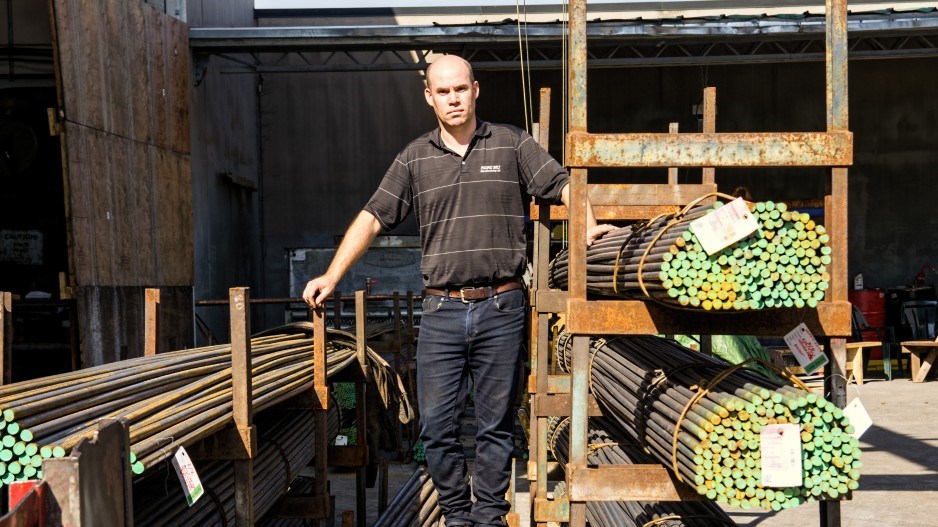A small Langley manufacturer that makes steel bolts is getting hammered by Canada’s retaliatory steel tariffs, to the tune of about $10,000 a week.
It’s also being “penalized” by BC Hydro for its increase in electricity use – an increase that resulted from doing what the company thought was the right thing when it switched to electric from natural-gas-fired furnaces at a cost of $600,000.
Trevor Borland, owner of Pacific Bolt Manufacturing, said federal and provincial policies and taxes make it tough enough for small manufacturers like him to operate in B.C., but Canada’s tariffs on American steel imports are making it a lot harder.
The company, which employs 45 people, makes custom anchor bolts and fasteners for light standards and bridges and for the marine, forestry and mining sectors. It buys about 90% of its raw steel from the U.S.
Earlier this year, the U.S. implemented duties of 25% on Canadian steel and 10% on Canadian aluminum exports. On July 1, Canada responded in kind with matching tariffs on American steel imports.
“So now my competition in Portland or Chicago has a 25% advantage on me because they’re only tariffing raw goods coming in,” Borland said. “It’s a double whammy for us. Our U.S. competition is more competitive than us because of their tax regime.”
Knowing the tariffs would add 25% to steel prices, Borland stockpiled as much as he could, but now that the stockpile is gone, he is paying $10,000 a week more for his steel.
The steel can sit for weeks or months in his yard before it is turned into bolts and fasteners and sold. He has to pay the tariffs within 15 days, but it sometimes takes weeks or months before his customers pay him.
Borland is passing the tariffs on to customers, but he now fears they might start buying their steel bolts from his competitors in the U.S. He added that the Canadian tariffs apply only to the raw steel coming in from the U.S., not the fabricated bolts.
“It’s almost more economical for us to buy products from our [American] competitors and sell it under our name than it is for us to manufacture it.”
Borland said he understands why Canada implemented retaliatory tariffs. But he said policy-makers need to know that they are having a negative impact on Canadian small businesses.
Borland is also frustrated with BC Hydro for failing to give him any credit for a technology switch that reduced his company’s carbon footprint.
Three years ago, he invested about $600,000 in two new electric furnaces to heat raw steel. They replaced inefficient natural-gas-fired furnaces.
Aside from getting no rebate from BC Hydro for switching from an inefficient system that burned a fossil fuel to a more energy-efficient system, the increase in electricity that resulted from the switch bumped him into a higher tier, so now he pays more per kilowatt hour than he did before.
Borland said the company’s overall energy bills are lower, but he thinks he should have gotten some kind of break for switching to a cleaner system.
“They make the capital investment – a significant capital investment – to become greener and then get penalized with a higher electricity rate,” said Andrew Wynn-Williams, B.C. vice-president for Canadian Manufacturers & Exporters. “So where’s the decision there to make the right decision for the environment?”
While there are federal plans to help businesses affected by steel tariffs, it’s a long and complicated process that smaller manufacturers might not have access to.
Wynn-Williams said the federal government could help manufacturers like Pacific Bolt by changing its accelerated capital cost allowance.
Companies in Canada can write off capital investments against taxable income over a two-year period, whereas in the U.S. it can be claimed immediately.
Wynn-Williams said that allowing large capital investments to be claimed as a tax deduction in the first year would be a huge advantage to companies like Pacific Bolt.
Because the BC NDP government has abandoned the carbon tax’s revenue neutrality, Wynn-Williams said some of the revenue from carbon taxes should be used to provide incentives to make investments in energy efficiency.




